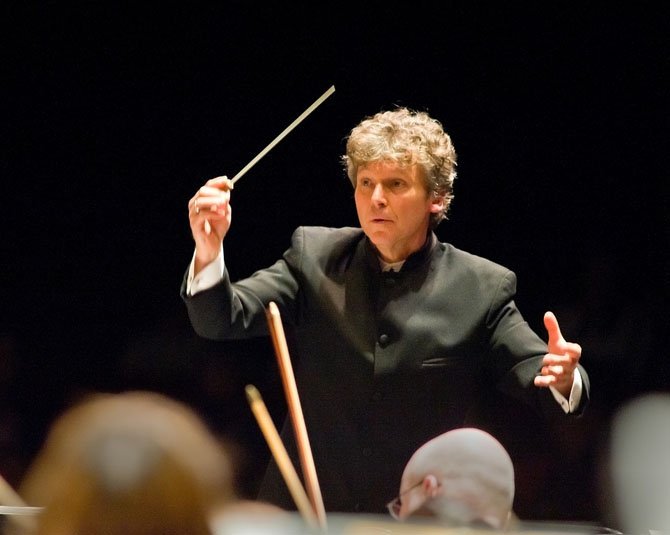By Stephen Brookes • The Washington Post • March 23, 2014
The Fairfax Symphony Orchestra has built a reputation for vivid, larger-than-life performances, so it was intriguing on Saturday night to hear a scaled-down version of the group in an evening of music for chamber orchestra. And, while the dull acoustics of George Mason University’s Harris Theater didn’t do the players any favors, the program — a thoughtful mix of (mostly) 20th-century works — proved that the FSO can be nearly as powerful in intimate works as it is with blockbusters.
 Music director Christopher Zimmerman, not one to coddle the ears, led off with Edgard Varese’s “Octandre,” a work that is still as explosive as it was in its 1924 debut. But after introducing it with great enthusiasm, Zimmerman suddenly pulled his punches. Noting that the modernist masterpiece “might not be for every taste,” he played only the second movement — and asked the audience to e-mail him if we wanted to hear the rest! Well, yes, maestro — we do. Please! Our ears aren’t going to fall off from a little Varese, for heaven’s sake.
Music director Christopher Zimmerman, not one to coddle the ears, led off with Edgard Varese’s “Octandre,” a work that is still as explosive as it was in its 1924 debut. But after introducing it with great enthusiasm, Zimmerman suddenly pulled his punches. Noting that the modernist masterpiece “might not be for every taste,” he played only the second movement — and asked the audience to e-mail him if we wanted to hear the rest! Well, yes, maestro — we do. Please! Our ears aren’t going to fall off from a little Varese, for heaven’s sake.
But after that minor hiccup, the evening got back on track with Benjamin Britten’s diaphanous and darkly beautiful “Nocturne, op. 60.” An eight-part song cycle built on texts from British poets, it’s a sort of reverie that explores the shifting, elusive world that lies on the edges of sleep. Tenor William Hite brought subtlety and appropriate strangeness to this deeply imaginative music, weaving his singing into the orchestral accompaniment with delicacy and great nuance.
Dmitri Shostakovich’s string quartets stand on their own as some of the most compelling and intimate works in the repertoire. That, alas, didn’t stop Russian violist Rudolf Barshai from inflating several of them into versions for chamber orchestra in 1953, and the “Chamber Symphony in D Major” is what results when you dress up the Fourth Quartet in a big string section, winds, horns and even (horrors!) percussion — and then pull out the stops.
It’s enough to make purists pass a gallstone, and while the arrangement itself really isn’t that bad — and the Fairfax players turned in a fine reading — the work stands as a reminder that more, sometimes, can turn out to be less. A spirited reading of Mozart’s ultra-lyrical Symphony No. 27 in G major, written when the composer was barely out of diapers, brought a lively and light-filled close to the evening.